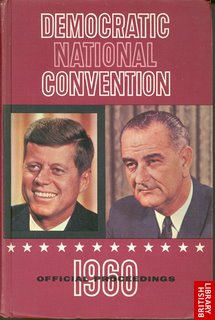Hillary's Dilemma is the Nation's Dilemma: Part 2

1960 was the first year that I actually aware that an election was happening. My family was vacationing at Oglebay Park in Wheeling, W.V. It took just one ballot for the Democratic National Convention in Los Angeles to nominate John Kennedy for President. The hotel rooms didn't have television sets, and we had to watch the convention in the lobby. It marked the first time in history that primaries played THE definitive role in the nomination process. Kennedy worked the primaries hard, and went into the convention with sufficient pledged delegates to win the nomination.
In the Republican Party, the battle was between the Rockefeller Republicans and the Goldwater Republicans. The Republicans were more comfortable with smoke filled room deals. Candidates had to work hard in local parties to gain support and pledged delegates. The political battles reached down as far as fighting for control of college Republican clubs. The burgeoning conservatives began their trek to political power in 1964 when the Republicans nominated Barry Goldwater for President. It was an election debacle, but it pushed party stalwarts towards the center in 1968 to nominate Richard Nixon, who was, contrary to conventional wisdom, a liberal Republican.
1968 marked a turning point in how Americans viewed political conventions and primaries. Hubert Humphrey was nominated by the Democratic Party in Chicago, with only minimal participation in the primary process. The left wing of the Democratic Party, forged in those tumultuous times, began to solidify its predominance in the party. It pushed the party to "democratize" the selection process, changing rules as to the how's and the what's for political primaries. The result was the nomination of George McGovern in 1972.
Watergate had the same effect on the Republicans. The resignation of Richard Nixon and the defeat of Gerald Ford marked the demise of the moderate wing of the Republican Party and the emergence of the so-called "neo-cons" or Reagan Republicans. The conservatives began the same process in the Republican Party that the liberals had accomplished in the Democratic Party.
The result was a complete political realignment in this country. Conservative Democrats, mostly in the south, deserted the party for the Republicans en masse. With the collapse of the traditionally Democratic solid south, the northeast and west coast liberal wings ran rampant in the Democratic Party. The process was less pronounced in the Republican Party, but it was clear that what Barry Goldwater had begun in 1964, came to full fruition in Ronald Reagan.
The right in the Republicans, and the left in the Democrats, moved forward jointly to solidify the role of the primary process in nominating presidential candidates. States formed alliances to hold their primaries on the same day, each jockeying for position to have the most influence in the primary process. There is still talk of trying to move the country to a national primary day, so states like New Hampshire and Iowa won't set the tone for the upcoming election.
It is the rise of the primary process that has polarized the parties into being controlled by the more extreme branches of their respective political philosophies. These folks are driven by ideology, and work 365 days a year to maintain their grip on the party political mechanism. The strength of the new political order is no more clearly demonstrated that in Connecticut, where Joe Lieberman was effectively forced out of the Democratic Party for not being liberal enough. In the Republican Party, Rudy Giulani, who could easily win the next presidential election, is not considered a serious candidate because he is not conservative enough. The smoke filled rooms, wrapped in corruption and dirty dealings, did have one positive effect. It forced the parties to nominate compromise candidates who tended to move to the middle. Good people are now being marginalized.
The founding fathers did not set this country up as a democracy. It was set up as a republic, with many layers to filter out the extremes in the electoral process. One by one, those layers are being eliminated. To be continued...
In the Republican Party, the battle was between the Rockefeller Republicans and the Goldwater Republicans. The Republicans were more comfortable with smoke filled room deals. Candidates had to work hard in local parties to gain support and pledged delegates. The political battles reached down as far as fighting for control of college Republican clubs. The burgeoning conservatives began their trek to political power in 1964 when the Republicans nominated Barry Goldwater for President. It was an election debacle, but it pushed party stalwarts towards the center in 1968 to nominate Richard Nixon, who was, contrary to conventional wisdom, a liberal Republican.
1968 marked a turning point in how Americans viewed political conventions and primaries. Hubert Humphrey was nominated by the Democratic Party in Chicago, with only minimal participation in the primary process. The left wing of the Democratic Party, forged in those tumultuous times, began to solidify its predominance in the party. It pushed the party to "democratize" the selection process, changing rules as to the how's and the what's for political primaries. The result was the nomination of George McGovern in 1972.
Watergate had the same effect on the Republicans. The resignation of Richard Nixon and the defeat of Gerald Ford marked the demise of the moderate wing of the Republican Party and the emergence of the so-called "neo-cons" or Reagan Republicans. The conservatives began the same process in the Republican Party that the liberals had accomplished in the Democratic Party.
The result was a complete political realignment in this country. Conservative Democrats, mostly in the south, deserted the party for the Republicans en masse. With the collapse of the traditionally Democratic solid south, the northeast and west coast liberal wings ran rampant in the Democratic Party. The process was less pronounced in the Republican Party, but it was clear that what Barry Goldwater had begun in 1964, came to full fruition in Ronald Reagan.
The right in the Republicans, and the left in the Democrats, moved forward jointly to solidify the role of the primary process in nominating presidential candidates. States formed alliances to hold their primaries on the same day, each jockeying for position to have the most influence in the primary process. There is still talk of trying to move the country to a national primary day, so states like New Hampshire and Iowa won't set the tone for the upcoming election.
It is the rise of the primary process that has polarized the parties into being controlled by the more extreme branches of their respective political philosophies. These folks are driven by ideology, and work 365 days a year to maintain their grip on the party political mechanism. The strength of the new political order is no more clearly demonstrated that in Connecticut, where Joe Lieberman was effectively forced out of the Democratic Party for not being liberal enough. In the Republican Party, Rudy Giulani, who could easily win the next presidential election, is not considered a serious candidate because he is not conservative enough. The smoke filled rooms, wrapped in corruption and dirty dealings, did have one positive effect. It forced the parties to nominate compromise candidates who tended to move to the middle. Good people are now being marginalized.
The founding fathers did not set this country up as a democracy. It was set up as a republic, with many layers to filter out the extremes in the electoral process. One by one, those layers are being eliminated. To be continued...


Comments